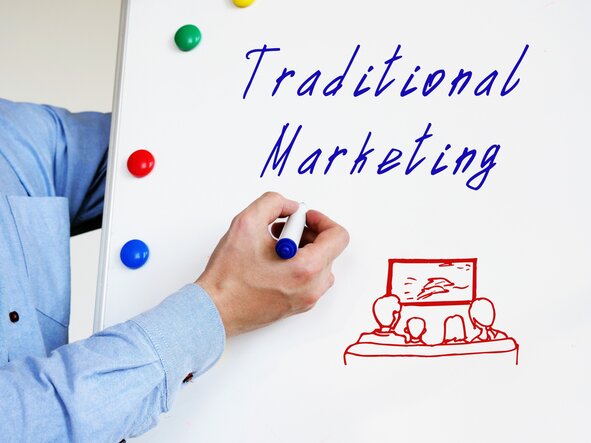Have you ever felt like you're shouting into a void, hoping someone would hear you? That's what traditional marketing feels like in today's digital age. Billboards, radio ads, and even TV commercials - once the giants of advertising - now seem like whispers amidst the cacophony of digital content.
For small business owners, this shift can be particularly unsettling.
You've invested time, money, and energy into tried-and-true traditional marketing methods, only to see diminishing returns. The symptoms are clear: declining sales, reduced customer engagement, and a brand that feels increasingly out of touch.
But these symptoms aren't just a phase; they're a sign of a larger transformation in the world of marketing. The digital age has ushered in a new era where consumers are empowered, connected, and more discerning than ever. They're no longer passive recipients of marketing messages; they're active participants, seeking authentic connections and meaningful interactions.
If you've noticed any of these symptoms in your business, it's not too late to pivot. The future of marketing is here, and it's digital, dynamic, and driven by data.
But before we delve into the solutions, let's understand the depth of the problem.
Common problems with traditional marketing
If your advertisements aren't generating the buzz they once did, it's a clear sign that your audience's preferences have evolved.
Maybe you’re spending more on print ads, TV commercials, or radio spots but seeing less return. This is not just about inflation or increased competition, it’s because the mediums themselves are becoming less effective as consumers shift their attention to digital platforms.
This kind of traditional marketing often lacks a direct feedback mechanism. If your business is struggling to gauge customer reactions or gather insights from your campaigns, you're missing out on valuable data that could shape your future strategies.
In an age where consumers are bombarded with content, generic messages get lost in the noise. If your campaigns aren't tailored to individual preferences, they're likely falling on deaf ears.
Ignoring the signs of a fading marketing strategy doesn't just mean missed sales. It means missed opportunities to connect, engage, and build lasting relationships with potential customers. In the digital age, every interaction counts, and missed interactions can lead to lost brand loyalty.
The ripple effects of an outdated, traditional marketing strategy can be far-reaching, impacting not just sales, but brand perception, customer loyalty, and overall business growth. But why is traditional marketing losing its charm in the first place?
Why traditional marketing is losing its charm
1. The rise of digital platforms
From social media to streaming services, digital platforms have become integral to our daily lives. These platforms offer advertisers precision targeting, real-time feedback, and a level of interactivity that traditional mediums can't match.
2. Changing consumer behavior
Today's consumers are not just passive viewers; they're active participants. They seek out reviews, engage with brands on social media, and expect personalized experiences. Traditional marketing, with its one-size-fits-all approach, struggles to meet these evolving expectations.
3. On-demand culture
With the advent of streaming services, DVRs, and ad-blockers, consumers now have more control over what they view and when. This means they can easily skip or avoid ads that don't resonate with them, making it harder for traditional ads to make an impact.
4. Data-driven decisions
The digital age is also the age of data. Online platforms provide businesses with a wealth of data, from user demographics to browsing habits. This data allows for more informed, targeted, and effective marketing campaigns.
5. Global reach
Traditional marketing often has geographical limitations. A billboard or a local TV ad can only reach so far. Digital marketing, on the other hand, has the potential to reach a global audience, opening up new markets and opportunities.
The digital revolution has changed the game, making it imperative for businesses to adapt or risk obsolescence. But it's not all doom and gloom.
Solving marketing challenges with technology
Precision targeting: AI algorithms can analyze vast amounts of data to identify patterns and preferences. This means you can target your marketing efforts with unparalleled precision, ensuring your message reaches the right audience at the right time.
Automated personalization: Gone are the days of generic marketing messages. AI can tailor content to individual users based on their browsing habits, purchase history, and more. This level of personalization enhances user engagement and increases conversion rates.
Predictive analysis: AI can predict future trends based on current data. For marketers, this means being able to anticipate customer needs and adjust strategies proactively, staying one step ahead of the competition.
Chatbots and virtual assistants: These AI-driven tools can provide instant customer support, answer queries, and even guide users through the purchasing process. They offer a level of 24/7 engagement that's hard to achieve with traditional methods.
Efficient ad spending: AI can optimize your ad spend by analyzing which channels and strategies yield the best ROI. This ensures that every dollar you invest in marketing is used effectively.
Embracing AI in marketing doesn't mean abandoning human touch; it means enhancing it. With AI, businesses can offer a more personalized, efficient, and engaging experience to their customers.
And the best part? You don't need to be a tech giant to leverage the power of AI.
Envisioning success with Bizzuka's AI solutions
At Bizzuka, we personally understand the unique challenges faced by small business owners, which is why we’ve created a weekly, no-cost CXO roundtable to help people like you learn how to implement AI in marketing.
When you join us each Friday, you’ll get the opportunity to learn and network with industry experts, diving deep into the world of AI marketing to understand its nuances and discover how to implement it effectively for your business.
Join a community of like-minded business owners, share experiences, learn from each other, and grow together. Register today to join us this Friday!

